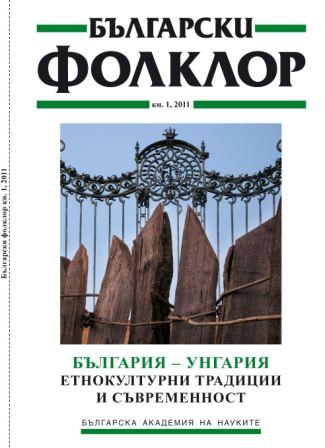Етнокултурни традиции и съвременност – български поглед към Унгария
Ethnocultural Traditions and Contemporary World – a Bulgarian Glance towards Hungary
Author(s): Natalia RashkovaSubject(s): Customs / Folklore
Published by: Институт за етнология и фолклористика с Етнографски музей при БАН
Summary/Abstract: The article results from the work on an already completed joint inter academic research project “Bulgarian-Hungarian Comparative Studies in Folklore Studies and Ethnology.” The framework of the project promotes the idea of observing and analyzing contemporary cultural expressions in two societies (the Bulgarian and the Hungarian one), which have followed a similar path in their social development; to outline the specificity of cultural transmission; to shed light on the forms of preser¬vation, introduction and establishment of ethnic traditions in the social life of the Hungarian society; as well as to present the emphases in the cultural policies of the Hungarian State. The scholarly problematic traces the significant place of local cultural diversity, the revitalization of traditions, and their involvement in contemporary cultural and educational practices. The current text presents some of the research observations within Hungarian fieldwork. The Hungarian self-reflexivity and identity expression through traditional national symbols and images conditions their use in contemporary life. Many of the traditional cultural elements are of special value for society and their use is pursued and made visible. The observations made during fieldwork in Hungary outline the existence and the achievement of such an approach. The systematic application of cultural policies opened towards the restoration of ethnocul¬tural traditions in contemporary world is illustrated with several examples of cultural events in urban setting, as observed during fieldwork research. These involve festivals of folk arts and crafts, overviews of wine production, days of village regions within European programs of development, folklore musical and dance performances, exhibitions. All of them present traditions in their entirety and involve the interactive participation and education of the audience. The article presents also examples of the presence and use of Hungarian traditional culture in nowadays’ tourist industry. A separate topic is the evolvement of a tendency to get closer to traditions, to develop awareness about the values and the life within the old culture. In Hungarian society, there exists a long-standing need to maintain continuity with traditions that have gained new meaning, content and form, that have been adjusted to contemporary conditions, and that have penetrated in contemporary culture.
Journal: Български фолклор
- Issue Year: XXXVII/2011
- Issue No: 1
- Page Range: 5-16
- Page Count: 12
- Language: Bulgarian
- Content File-PDF

